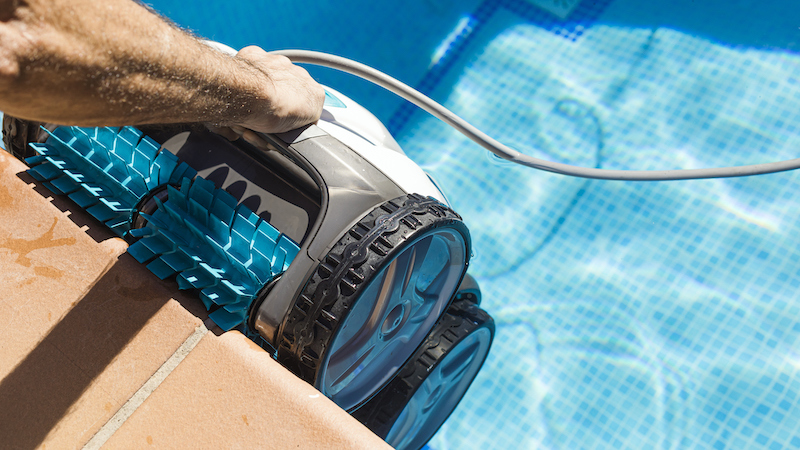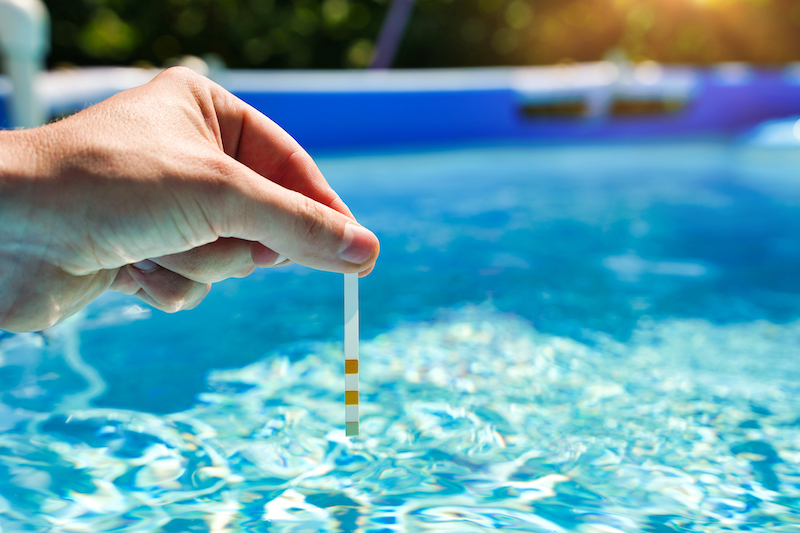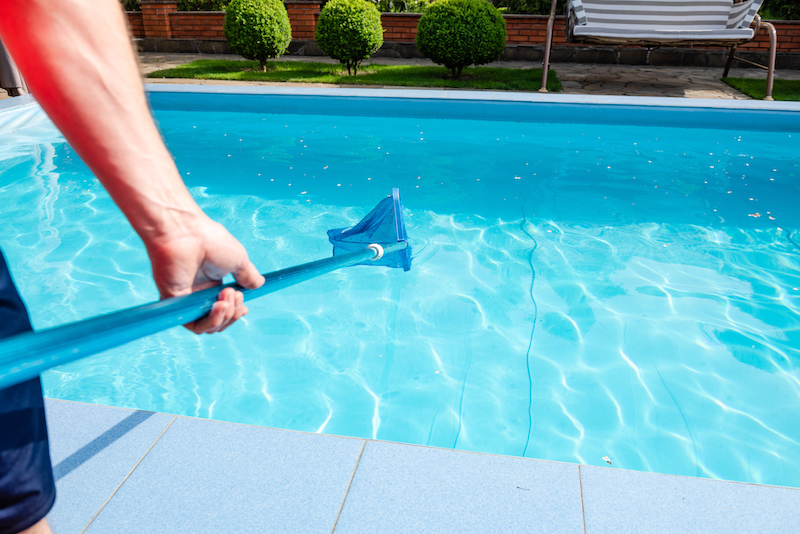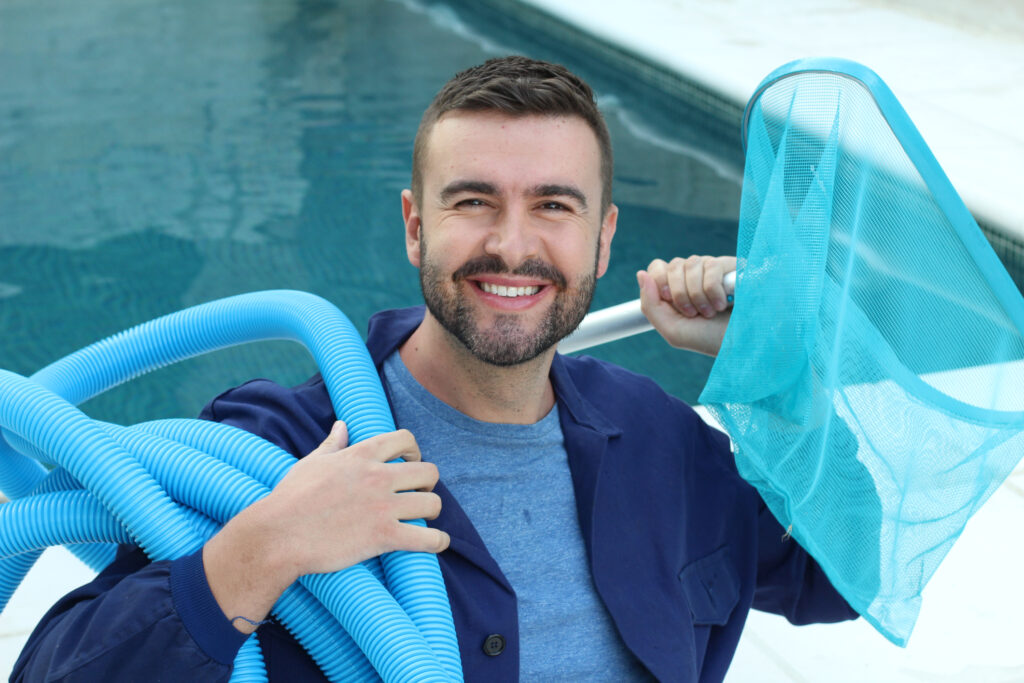Owning a swimming pool is a great way to increase the value of your property and provide an enjoyable outdoor space for your family and friends. However, being a pool owner also comes with the responsibility of regular maintenance to ensure that your pool stays clean, safe, and fun.
Regular pool maintenance is not just about preventing dirty water or removing floating debris. It encompasses a more complex process involving the essential parts of your pool, the chemical balance of your pool water, and the monitoring of your pool equipment, to name a few. All these contribute to ensuring a healthy and safe swimming environment, preventing costly major repairs or replacements, and prolonging the lifespan of your pool.
In this comprehensive guide, we aim to walk beginning pool owners like you through the ins and outs of pool maintenance. You’ll find tips on how to regulate chlorine levels, maintain pH levels, balance calcium hardness, handle pool chemicals, and more. This ultimate guide is designed to provide you with all you need to keep your pool water sparkling clear and your swimming experience enjoyable year-round.

Understanding the Basics of Pool Maintenance
Maintaining a swimming pool exceeds the surface-level expectation of just keeping it sparkly clean. Sure, it involves cleaning tasks such as skimming off leaves and debris, but there’s a lot more to do beneath the surface level. If you’re a new pool owner looking to understand pool maintenance better, you’ve come to the right place! Let’s dive into the key components.
Essential Parts of Your Pool
First off, you need to understand the different parts of your swimming pool and their respective roles. The pool pump, for instance, works like the heart of your pool’s circulation system. It pulls water from the pool through the skimmer and main drain, pushes it through the filter, and returns it through the return inlets. The pool filter, on the other hand, helps clean the pool water by removing visible and microscopic debris.
Another key component you will come across is the skimmer basket, which is designed to catch leaves and other debris before they sink to the bottom or pass through the system. Familiarize yourself with other pool equipment such as the pool cover, automatic pool cleaner, and cartridge filter, which all have vital roles to play in maintaining the cleanliness of your pool and enhancing your swimming experience.
Water Chemistry
On a molecular level, a lot is happening in your pool water. Understanding water chemistry is crucial to maintaining a healthy and balanced pool. This includes factors such as the chlorine level, which keeps your pool’s water free from harmful bacteria and algae, and pH level, the measure of how acidic or basic the water is. The water should also have the right calcium hardness level, i.e., the amount of dissolved calcium in the water, to avoid scale formation or corrosive water.
The chemical balance of all these elements is crucial. It ensures that the pool is properly sanitized and comfortable for swimmers and that the water is clear and inviting. An imbalance in these chemicals can lead to issues such as cloudy water, algae growth, and even potential damage to the pool equipment and surface.
As a novice pool owner, you might find all this information overwhelming. But don’t worry! With careful guidance and regular practice, pool maintenance will soon become a manageable part of your routine.
Fundamental Steps for Proper Pool Maintenance

Now that we’ve covered the basics, it’s time to dive into the practical steps of pool maintenance. Keep in mind; that these tasks are essential for having a safe, clean, and inviting pool.
Regular Cleaning
Cleaning your pool and pool equipment is vital and should be done consistently. Make it a habit to skim and brush your pool walls and floor to remove debris and reduce algae growth. For these tasks, you’ll need basic tools like a pool net, pool brush, and possibly an automatic pool cleaner. Don’t forget to check and clean the skimmer basket and pump basket too. Regular cleaning helps keep your water clear and extends the lifespan of your pool equipment by preventing obstruction and improving circulation.
Controlling Chemical Levels:
Balancing your pool chemicals is a critical aspect of pool maintenance. This not only makes your water safe but clear, balanced, and comfortable for swimmers. You’ll need to regularly test your pool’s water for pH balance, chlorine level, cyanuric acid, calcium hardness, and total alkalinity. To do this, you can use basic pool water testing kits or strips that indicate whether your chemical levels are low, high, or just right. If an imbalance is detected, pool chemicals will be needed to correct it. Always handle these chemicals with care, following the manufacturer’s instructions closely.
Monitoring Water Level
Your swimming pool water level can fluctuate due to evaporation or heavy pool usage. It’s essential to maintain the proper water level to ensure skimmers function correctly and the pump doesn’t take in air, which can cause damage. The water level should be at the center level of your pool skimmer or pool tile for optimal results. If the water level is low, you can refill your pool with a garden hose. In case of excessive water due to rain or overfilling, you might need to drain some water using a submersible pump or your pool’s filtration system, if equipped with a multi-port valve.
Regular Assessment of Pool Equipment
Regularly check your pool equipment for any leaks, malfunctions, or wear and tear. Regular maintenance checks can prevent minor issues from becoming significant, expensive problems down the road.
Taking up pool maintenance as a beginner might seem daunting. However, with regular practices, patience, and dedication to a few hours a week, coping with pool maintenance might become a smooth, systematic routine.
Special Considerations for Different Types of Pools

Different types of pools may require some unique considerations when it comes to maintenance. Whether you own a saltwater pool, chlorine, or a pool with a cartridge filter, each comes with its unique set of characteristics and requirements.
Saltwater Pools
If you’re an owner of a saltwater pool, you’re not off the hook when it comes to regular maintenance. While saltwater pools require less hands-on chlorine management, they still necessitate regular monitoring of chemical levels. Interestingly, saltwater pools generate their chlorine, but you’ll still need to monitor the system and check the salt cell regularly. Conduct routine tests to check the sanitizer levels and ensure that they meet the recommended standards. Additionally, saltwater can be corrosive, so make sure you are checking your pool equipment more frequently for any possible damage.
Pools with Cartridge Filters
If your swimming pool uses a cartridge filter, it’s good news because they are generally easier to maintain compared to sand or diatomaceous earth (DE) filters. However, the cartridge inside needs to be cleaned regularly to keep the filtration system doing its job properly. This typically involves rinsing off the cartridge with a hose every few weeks or so, and replacing the cartridge every 2-3 years, depending on the usage.
No matter the specifics, all types of pools share the basic requirements of regular cleaning, proper chemical balance, and equipment checks. Pool owners must stay committed to these fundamentals while adjusting their schedule to accommodate any distinctive features your pools may have!

Why Choose Net Positive Pools for Your Pool Maintenance Needs
Let’s face it, pool maintenance isn’t always a walk in the park. It does require time, effort, and a certain level of knowledge to keep your pool sparkling clean and in perfect balance. That’s where we can help. At Net Positive Pools, we believe that being a pool owner should be about the joy of relaxation and fun, not added work and stress.
We’ve developed two Weekly Pool Maintenance Programs designed to take the weight of pool maintenance off your shoulders. Whether you choose our full-service program or the chemical-only option, you’ll receive top-notch service from our skilled professionals. Our dependable weekly maintenance team will ensure your pool is always ready for a swim and stays in top shape all season.
When you choose our full-service program, you get comprehensive weekly care of your pool. This includes regular cleaning, water chemistry management, equipment checks, and all minor chemical additions required to maintain a balanced pool. So all you have to do is jump in and enjoy!
On the other hand, our chemical-only option features the monitoring and regulation of your pool’s chemical balance. This way, you can engage in routine cleaning tasks if you prefer, while leaving the intricate art of water chemistry to us.
Over the years, we have helped countless pool owners from communities in Huntersville, NC, Greenville, SC, Statesville, NC, York County, SC and Charleston, SC. Their satisfaction and continuous trust in our services are a testament to our professionalism, dedication, and reliability.
Maintaining your pool can be a breeze when you have Net Positive Pools on your side. Trust us with your pool today, and instead of sweating over pool maintenance tasks, you can devote more of your spare time to enjoying the fun and relaxation that your pool has to offer. Contact us today!
References
“Swimming Pools – Water Quality.” Better Health Channel, Department of Health & Human Services, 5 Mar. 2003, www.betterhealth.vic.gov.au/health/healthyliving/swimming-pools-water-quality#safety-suggestions-for-pool-chemicals.
